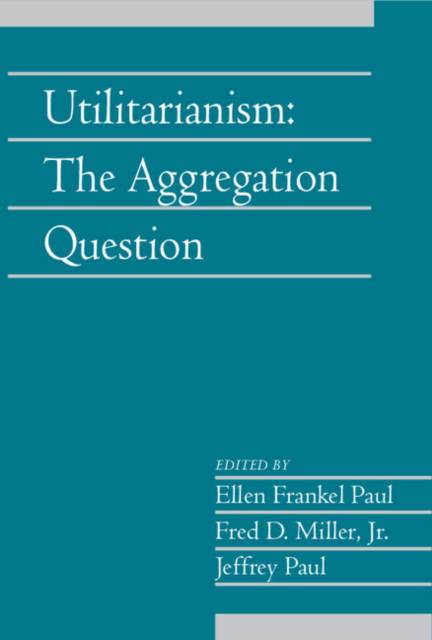
- Afhalen na 1 uur in een winkel met voorraad
- Gratis thuislevering in België vanaf € 30
- Ruim aanbod met 7 miljoen producten
- Afhalen na 1 uur in een winkel met voorraad
- Gratis thuislevering in België vanaf € 30
- Ruim aanbod met 7 miljoen producten
Zoeken
Utilitarianism: Volume 26, Part 1
The Aggregation Question
€ 44,95
+ 89 punten
Omschrijving
Utilitarianism and other aggregationist moral theories view the public interest or the general welfare as an aggregate of individual goods. But critics of these theories question whether there is adequate justification for employing the concept of an aggregate social good. How are we supposed to sum up individual interests? Is it even possible to compare the utilities of different people or to assign values to individual utilities that can be added or subtracted? If not, how is the general good to be aggregated? Critics have also raised concerns about the aggregative approach in ethics--concerns about its implications for distributive justice, individual liberty, and democratic institutions. The essays in this volume explore these issues and address related questions. Some of them examine specific objections to aggregation, others analyze the very idea of a social good or social welfare. Other essays discuss the application of aggregative principles to particular problems.
Specificaties
Betrokkenen
- Uitgeverij:
Inhoud
- Aantal bladzijden:
- 404
- Taal:
- Engels
- Reeks:
Eigenschappen
- Productcode (EAN):
- 9780521756327
- Verschijningsdatum:
- 27/09/2010
- Uitvoering:
- Paperback
- Formaat:
- Trade paperback (VS)
- Afmetingen:
- 150 mm x 226 mm
- Gewicht:
- 539 g

Alleen bij Standaard Boekhandel
+ 89 punten op je klantenkaart van Standaard Boekhandel
Beoordelingen
We publiceren alleen reviews die voldoen aan de voorwaarden voor reviews. Bekijk onze voorwaarden voor reviews.










